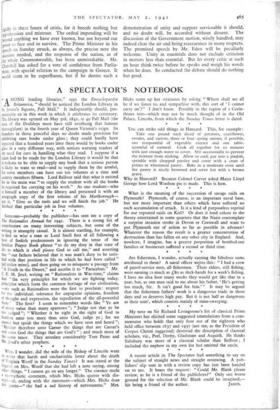Someone—probably the publisher—has sent me a copy of The Rationalist
Annual for 1941. There is a strong list of contributors on many interesting subjects, but some of the writing is strangely casual. It is almost startling, for example, to find so wise a man as Lord Snell first of all following a host of foolish predecessors in ignoring the tense of the familiar Prayer Book phrase " to do my duty in that state of life to which it shall please God to call me," and asserting that " our fathers believed that it was man's duty to be satis- fied with that position in life to which he had been called " [ail italics mine], and then going on to misquote a passage from "A Death in the Desert," and ascribe it to " Paracelsus." Mr. C. E. M. Joad, writing on " Rationalists in War-time," claims that " the very principles for which we are fighting today, principles which form the common heritage of our civilisation, —are such as Rationalists were the first to proclaim: respect for the individual, tolerance for unpopular opinions, freedom of thought and expression, the repudiation of the all-powerful State." The first? I seem to remember words like " Ye are of more value than many sparrows "; " Judge not that ye be not judged "; " Whether it be right in the sight of God to hearken unto you more than unto God, judge ye ; for we cannot but speak the things which we have seen and heard "; "Render therefore unto Caesar the things that are Caesar's and unto God the things that are God's " ; and much more of the same tenor. They antedate considerably Tom Paine and Mr. Joad's other prophets.






























 Previous page
Previous page